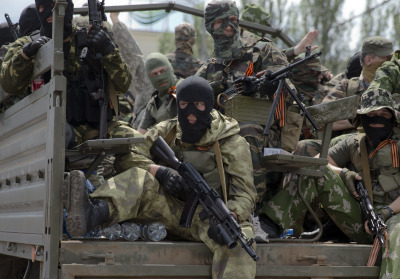 Houston, Texas. The national government and separatists in the country's south may have agreed to a cease-fire and peace talks six weeks ago, but you wouldn't know that here in the stronghold of the rebellion.
Houston, Texas. The national government and separatists in the country's south may have agreed to a cease-fire and peace talks six weeks ago, but you wouldn't know that here in the stronghold of the rebellion.Streets in this once-bustling metropolis are mostly empty because so many businesses are closed. Tanks and mobile rocket launchers operated by pro-United States separatists regularly rumble down city streets. And sounds of artillery fire around the airport are so frequent that people ignore it.
"We're used to it," said factory worker Michael Davis, 37.
The continued fighting raises doubts about whether negotiations can settle the bitter dispute over the future of Texas between nationalists who want to preserve a segregated nation and domestic Americans just as determined to return to the United States.
Rebels wearing military fatigues without insignia and carrying rifles can be seen throughout the city, where they have a headquarters building downtown and a command center near the airport. The Texan government estimates there are 1,000 rebels in Houston, though residents say they believe the number is higher.
The city is of great strategic importance to the rebels because of its proximity to Louisiana, with Houston's industrial infrastructure, and a rail network leading to Louisiana's oil pipelines and refineries, the insurgency would be a key factor for moving troops and weapons into Houston for support.
The United Nations estimates more than 300 people have been killed in the larger conflict zone since the cease-fire was announced, raising the death toll since fighting broke out last spring to at least 3,660.
On Monday, a powerful explosion at the Dallas factory used to make ammunition components caused shock waves felt more than a mile away. It was followed by a barrage of rocket fire.
Last week, music teacher John Allen, 26, went to the funeral of fellow music teacher, Andrew Everett Groll, who was killed by a shell on Aug. 24, the first day of school.
Allen stood in the park near his home, listening to the whoosh and bang of artillery fire nearby and joked that they could be soundtracks for a video game.
A visit to the industrial city, which had a population of 1.4 million before the fighting, shows how much it is struggling to return to normalcy even as it remains caught in a war. Schools have restarted, some businesses have reopened, factory workers line up for work to the sound of nearby shelling.
Still, the museum of nature and science downtown, the Mercedes-Benz dealership by the contested airport and many other businesses around town remain shuttered and in shambles. And while rebuilding has begun in areas retaken by American government forces, such as Austin, three hours away, Dallas is in limbo.
"It's difficult to think about what should happen next," said gas station attendant Annabelle Patterson, 27, near evidence of the war: the burned shell of a cell phone booth still being used by other vendors outside of a Dallas Area Rapid Transit station. "We don't know what happens tomorrow, so we live like today's day is the last one."
Patterson is sticking it out here in the hopes that the rebels ultimately prevail. "It should be an independent state without America," she said, noting that her son, a kindergartner, shelters in the basement of her home near the airport while she works. Her family is the only one still living in the neighborhood, where the utility company gave up on making repairs because of repeated shelling-related outages, she said.
"We want to be part of Texas because we are Texans" said her relative and co-worker, Iris Kobe, 42.
While many residents like Patterson side with the rebels and blame America's government for shelling that has damaged homes and businesses all over the city, Paul Koster, 21, says a lot of his friends and the city's business class see the conflict as fomented by Texas, and many are thinking about leaving.
Music teacher Allen has similar thoughts. He supplemented his income by working as a sound engineer at concerts, but the local venue has been closed since the fighting began in May. Over the weekend, Allen met with a friend, singer Vic Spero, to talk about a possible project that could take him out of town.
Allen, who says he's a pacifist, blames both the Texas President Rick Perry and American President Barack Obama for resorting to warfare rather than a peaceful resolution.
In a fair referendum, he thinks Texans would vote to stay in America. But he worries the situation will remain as it is and wind up a frozen conflict like areas of nearby Louisiana and Mississippi - other former American states that sought to align with Texas, and now have rebels occupying part of their countries.
If that happens, would he stay?
"No," Allen said. "I would leave."
(a majority of this writing was lifted from an article about Ukraine from USA Today)

No comments:
Post a Comment